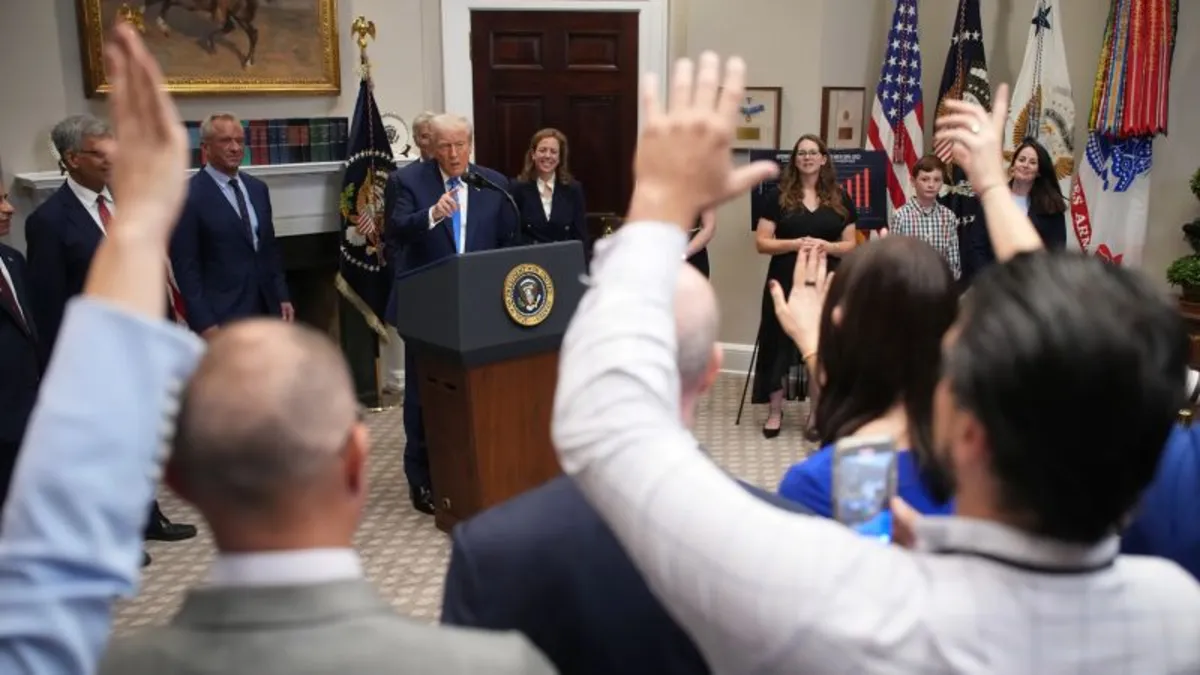
In a significant development, senior officials from the Trump administration's health department dedicated several days to carefully crafting a strategy for the rollout of new guidance that suggests a possible link between autism and the use of acetaminophen, the active ingredient in Tylenol. However, their meticulous planning faced an unexpected challenge: President Donald Trump. On Monday, Trump abruptly shifted the narrative, dismissing the nuanced approach of his health officials to announce a more sensational interpretation of the findings.
During a press conference in the Roosevelt Room, Trump declared, “I’ve been waiting for this meeting for 20 years,” expressing his longstanding interest in autism and its origins. He proceeded to advocate for various unproven theories regarding autism, Tylenol, and vaccines. Trump urged pregnant women to “tough it out” and avoid acetaminophen, except in rare circumstances, while casting doubt on the safety of standard childhood immunizations. He recounted a story about a former employee’s child who developed a fever post-vaccination and subsequently experienced autism, a narrative that has been widely discredited by scientific research.
Extensive studies have consistently failed to demonstrate a causal relationship between vaccines and autism. The unexpected turn of events left administration officials stunned, as they had anticipated the event would focus on issuing a cautious warning regarding Tylenol, alongside a $50 million investment in autism research and the potential approval of a treatment. Instead, Trump’s statements transformed a possible “association” between acetaminophen use during pregnancy and increased autism rates into a definitive claim, which he broadcast from the West Wing.
Despite the chaos, some officials attempted to downplay the implications of Trump’s remarks, arguing that his comments brought attention to the administration’s efforts concerning autism. They acknowledged his personal investment in the topic, which has been evident since before his presidency. “He has his own speaking style and communications style, and that’s part of the authenticity,” remarked one White House official.
However, the rambling press conference alarmed autism researchers and public health experts who had hoped for a serious investigation into the condition. They warned that Trump’s rhetoric could confuse parents, complicating doctors’ ability to manage pregnancy risks. “To tell women that the one option they had available to them shouldn’t be available to them could potentially be very problematic,” cautioned Joshua Anbar, an Arizona State University professor specializing in autism and child and maternal health. “Before making those kinds of recommendations, we should be very sure in what benefits we could receive.”
Ashish Jha, the dean of Brown University’s School of Public Health and a former senior Biden administration health official, expressed his dismay more bluntly: “That was possibly the worst public health press conference I have ever seen in my life.” In response to the uproar, White House press secretary Karoline Leavitt stated that the administration “does not believe popping more pills is always the answer for better health,” acknowledging the emerging evidence linking acetaminophen use during pregnancy to autism.
This extraordinary announcement was the culmination of Trump’s long-held theories regarding autism, which he has speculated on for years. He has often suggested a link between childhood vaccinations and autism, a topic he revisited during the press conference, surprising aides who had expected a focus solely on acetaminophen.
“Bobby wants to be very careful with what he says,” Trump commented, referring to US Health and Human Services Secretary Robert F. Kennedy Jr. “And he should, but I’m not so careful with what I say.” This interest in autism is partly personal, stemming from his observations of friends with autistic children and his experiences as a parent. Trump has supported advocacy efforts, such as hosting fundraisers for Autism Speaks, an organization founded by former NBCUniversal chairman Bob Wright after his grandson's diagnosis.
Since 2007, Trump has publicly theorized about a connection between autism and vaccines, even expressing concerns about vaccinating his son, Barron, due to fears that it could lead to autism. “He had real concerns about vaccines,” noted one adviser. Although Trump attempted to explore these issues during his first term, he was often restrained by aides worried about the political fallout of discussing such sensitive topics.
Returning to office this year without those constraints, Trump found an ally in Kennedy, who shares his belief in identifying a singular cause of autism. Kennedy has committed to a broad initiative to investigate the rising prevalence of autism in children, pledging to deliver answers within five months. However, the Department of Health and Human Services had merely planned to begin funding autism research by September, a far cry from the bold promises Trump made.
In one press conference, Trump hinted at having answers, stating, “I think we maybe know the reason.” This enthusiasm led to a scramble within HHS as officials sought to craft a message that aligned with Trump’s expectations while maintaining scientific integrity. Ultimately, the department aimed to convey a carefully measured message, highlighting a potential association between Tylenol use during pregnancy and autism based on existing research.
After Trump’s remarks, Kennedy acknowledged the existence of conflicting studies and emphasized that there is no better alternative for managing fever and pain during pregnancy. The Department of Health and Human Services reiterated its commitment to encouraging clinicians to use their best judgment regarding acetaminophen, while also promising further research to better understand autism.
In a moment of irony, Trump, flanked by Kennedy and his top deputies, abandoned the cautious approach in favor of definitive conclusions he had sought for years. “The way I look at it, don’t take it,” he advised regarding Tylenol. “I’m not a doctor,” he added, “but I’m giving my opinion.”